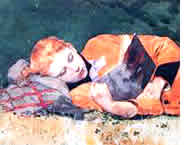| |||||||||||||||||||||||||||||||||
| Getting Started | |||
| Scholars argue> | Yes | No | Jesus Theories |
| Facts > | Sourcebook Anthologies | Sourcebooks: ancient texts | |
| Background > | Ancient Civilization | Ancient Religion | Early Christianity |
| Special topics | Mystery Religions | Ancient Judaism | |
| Amateur > | Pagan Origins | Hablo Greek-o | |
| Jesus
theories |
  There are dozens and dozens of books in print claiming to have discovered who the "historical Jesus" really was. Here's why: by the early twentieth century rationalist scholarship had destroyed the idea that the gospels are eyewitness records, or even histories at all. They are theologies, written around older collections of sayings and stories (so the theory goes).Fine. Now what? The way to understand Christianity seemed to be to get at the real historical Jesus by studying those sayings and stories. Twentieth century New Testament scholarship focused on finding the real "Historical Jesus" in the "authentic" sayings and stories of the New Testament. Trouble is, the search for the historical Jesus gives different people different Jesoi. Here's now it's done. You pick a theme—Cynic philosopher, magician, Rabbi, end-of-the-world visionary—and emphasize the New Testament verses that confirm that theme. Verses that confirm a different theme, you dismiss. Here's a smattering: |
| The
Sacred Mushroom and the Cross by John Allegro
|
What
you'll find:
Not quite as nutty as it sounds, since a number of cultures do use hallucinogenic mushrooms in religious rituals. Still, one wonders, what the hell were you thinking, John? This book destroyed Allegro's academic career.
|
|
|
|
Cynics and Christian Origins
|
What
you'll find:
Even if it weren't true, Downing's book would be a fascinating look at a niche of ancient history/ thought you didn't know existed. Would be, that is, if Downing could write a coherent paragraph, and organize his ideas. He can't. I've read hundreds of books about Christian origins — this one is absolutely the worst, coherence-wise. I wonder if Downing was sampling some of Allegro's Jesus mushroom.
|
|
|
|
The Jesus Puzzle by Earl Doherty
|
What you'll find:
Doherty, like professor G.A. Wells, notices that Paul and the other first century New Testament authors never give details about the Jesus of later Galillean legend. From which Doherty concludes there never was a Galillean Jesus; Christianity started wiht a mythic godman, later generations invented the earthly "history." Good use of primary sources, but this theory can only be correct if a number of odd coincidences explain away evidence that does seem most naturally to point to a real person Jesus.
|
|
|
| The Historical
Evidence for Jesus |
What you'll find:
|
||||||||
|
|||||||||
|
|
|
Jesus
the Magician  |
What
you'll find:
Tedious.
|
|
The Lost Gospel: The
Book of Q & Christian Origins
|
What you'll find:
Basically another Jesus Theories book.
|
Deconstructing
Jesus
|
What you'll find:
Is this the final word on who Jesus was or wasn't? No, it's not. It is a useful look at the methods and conclusions of modern New Testament scholarship—by an academic who isn't impressed by either. Price is an academic who understands the orthodox scholarly theories, though he doesn't buy them. His theme is that nothing we know about Jesus is historical, everything is mythical. The book follows the regulation scholarship, starting with the "Jesus People," (an academic term for Jesus' first followers; the Jesus People weren't really Christians, since they didn't believe Jesus was God or that he had risen from the dead), on to the first groups who worshiped Jesus as God, the Christ-cults (another academic term), through Jewish Messianic expectations, non-orthodox early Christianities and even ancient novels, which reveal a cultural theme of escape from crucifixion. The point is not one-for-one parallels between Jesus and, say, Mithras or Osiris. The point is that the first Christians took the basic ideas of their culture and adapted them to their new faith. |
|
|









